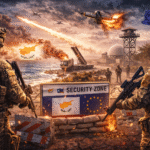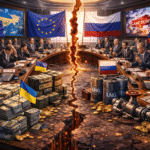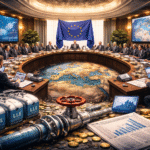The European Union is facing renewed internal and external pressure as its foreign ministers meet in Brussels to address two critical geopolitical issues: the worsening humanitarian crisis in Gaza and the bloc’s proposed ban on Russian gas. At the center of today’s discussions are concerns about the effectiveness and transparency of a new EU-Israel aid agreement and legal doubts surrounding the planned phase-out of Russian gas imports.
Aid Deal with Israel Sparks Skepticism
EU chief diplomat Kaja Kallas’s recent deal with Israel to expand aid shipments into Gaza is under scrutiny amid ongoing Israeli military actions and accusations that humanitarian aid is being used as leverage rather than delivered as a protected right.
Sigrid Kaag, who recently stepped down as the UN’s special co-ordinator for the Middle East Peace Process, welcomed the initiative in principle but warned that “the devil is in the details.” She questioned the scope, guarantees, and volume of the aid, suggesting that this could be another instance of well-intentioned but poorly executed diplomacy.
“It does read like a déjà-vu on many levels,” Kaag told the Financial Times, cautioning that aid should not be weaponized or turned into a negotiating tool.
Since the announcement of the deal last week, several civilians, including children, have reportedly been killed while seeking aid from the Israel-backed Gaza Humanitarian Foundation, further fuelling criticism.
Sanctions on Israel Under Consideration
The EU’s 27 foreign ministers are also expected to discuss possible sanctions on Israel in response to the devastation in Gaza, where 2.1 million people face starvation amid extensive infrastructure destruction.
Options being considered range from trade restrictions to a suspension of the EU-Israel association agreement, the main framework governing bilateral relations.
Ireland’s Europe Minister Thomas Byrne, alongside Spain, has called for a formal review of the agreement and is urging member states to adopt a ban on goods imported from Israeli settlements in the occupied West Bank.
“That would be much stronger if it came from the EU and would apply a huge amount of pressure,” Byrne said.
However, Kaag highlighted internal EU divisions as a major obstacle to action, noting the bloc’s limited ability to exert unified political pressure.
Russian Gas Ban Faces Legal and Political Challenges
The EU’s proposed ban on Russian gas—part of its broader sanctions strategy following Russia’s invasion of Ukraine—faces legal uncertainty. The European Commission aims to phase out Russian gas imports by 2027, starting with spot contracts, and seeks to bypass unanimous approval by classifying the ban under the EU’s common commercial policy, which only requires a weighted majority vote.
However, legal experts warn the plan could be vulnerable in court.
“It cannot be used to adopt internal laws,” said Ana Stanič, an energy lawyer advising an EU member state.
Leigh Hancher of Baker Botts law firm described the approach as entering a “grey area”, noting that such legal grounds had never been used in this context and are already sparking heated debate among EU member states.
Meanwhile, Slovakia, a key buyer of Russian gas, has signaled its intent to veto the latest EU sanctions package, citing unresolved concerns about the economic fallout and demanding compensation mechanisms from Brussels.
Broader Geopolitical Context
Today’s meeting takes place amid a turbulent geopolitical landscape:
- Donald Trump has threatened severe tariffs on Russia if it fails to end the war in Ukraine.
- The EU is considering leveraging frozen Russian state assets to fund aid for Ukraine, a move that Euroclear warns could be viewed as “expropriation.”
- In Hungary, scrutiny intensifies over allegations that Prime Minister Viktor Orbán’s son-in-law built his wealth through political favoritism.
What to Watch Today
- EU foreign ministers convene in Brussels.
- German Foreign Minister Johann Wadephul and Slovenian counterpart Tanja Fajon hold a joint press conference in Berlin.
Conclusion
As humanitarian and geopolitical crises intensify, the EU is grappling with complex questions of legal authority, diplomatic strategy, and internal cohesion. The outcomes of today’s foreign ministers’ meeting could shape the EU’s influence in two of the world’s most volatile regions—Gaza and Ukraine—for months to come.








